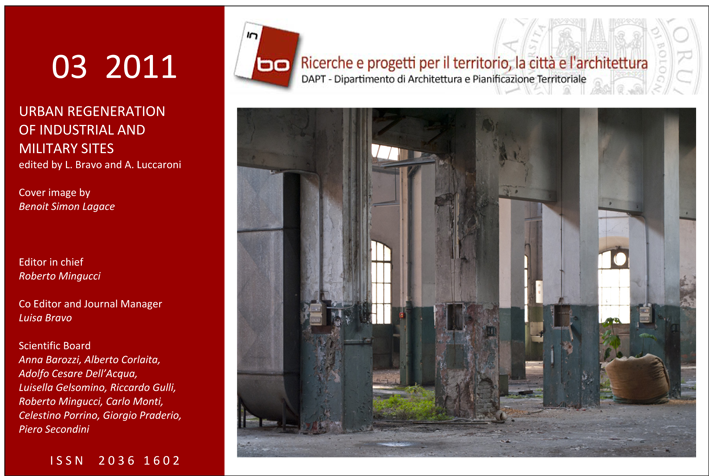Urban regeneration: professional practice, education, research
DOI:
https://doi.org/10.6092/issn.2036-1602/2623Abstract
Issue 3/2011 of IN_BO represents a significant evolution in the life of the journal.
As we always have reported, IN_BO was founded with the aim to compare research experiences and studies developed from different scientific fields, referring in particular, to knowledge and representation of landscape, city and architecture. This issue follow, in a very effective synthesis, this intention, comparing ideas, experiences and projects on the topic of urban regeneration.
IN_BO has also the intention to work for the construction of a mature design sensibility, more related to values and meanings, also ready to creativity and experimentation, rather than the strict regulatory compliance, although this represents an unavoidable and necessary step. And that's what this issue tries to do, by setting an argument, by gathering inspiration in comparison with international experiences, by opening up to multiple readings and multiple interpretations. This modus operandi is certainly useful for students and researchers, but equally it is for technicians and professionals in the global world that must reckon with references, cultural and related to design, which transcend national boundaries in search of a new dimension and a born-again identity. IN_BO, therefore, can be an instrument of knowledge, becoming a container for many experiences, and at the same time a place of dialogue with several voices, open, continuous and constructive. A place where the world of academy and the world of professionals meet in a mutual, beneficial exchange.
Downloads
Published
How to Cite
Issue
Section
License
Copyright (c) 2011 Roberto Mingucci, Luisa Bravo
Copyrights and publishing rights of all the texts on this journal belong to the respective authors without restrictions.
This journal is licensed under a Creative Commons Attribution-NonCommercial 4.0 International License (full legal code).
See also our Open Access Policy.
Metadata
All the metadata of the published material is released in the public domain and may be used by anyone free of charge. This includes references.
Metadata — including references — may be re-used in any medium without prior permission for both not-for-profit and for-profit purposes. We kindly ask users to provide a link to the original metadata record.







